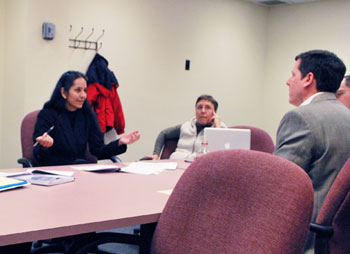Council Audit Committee to Strengthen Role
The Jan. 24, 2013 meeting of the Ann Arbor city council’s audit committee signaled a more actively engaged role for that group in the future. It was prompted in part by a report submitted by the city’s outside financial auditor late last year – on which the committee did not appear to have a unanimous consensus at the Jan. 24 meeting. The audit was conducted by the firm Rehmann, which is now in the first year of a five-year contract to perform auditing services for the city.

Sumi Kailasapathy (Ward 1) questioned CFO Tom Crawford’s conclusions about the travel and mileage policies at the audit committee’s Jan. 24, 2013 meeting. (Photo by the writer.)
Listed among other relatively minor matters in Rehmann’s report was a note identifying three instances of an employee who had claimed mileage reimbursement despite receiving a vehicle allowance. At a scheduled Dec. 20, 2012 meeting of the audit committee, the dual claims were described by Rehmann’s Mark Kettner as a “double dip.” Those claims were also cited in Kettner’s written report as a violation of city policy.
The Chronicle’s write-up of the auditor’s presentation late last year to the audit committee – which did not achieve a quorum on that occasion – included the result of additional reporting: Mileage claims made by city attorney Stephen Postema caused the auditor to flag the issue in his formal report.
But at the Jan. 24 committee meeting, Kettner revealed that he’d been convinced to change the wording of the note. The new wording will not indicate a “violation” of city policy. At the meeting, however, Kettner indicated that a note about this issue would still be included – with the exact wording yet to be settled. City CFO Tom Crawford’s written response to the auditor’s report includes email messages that show it was Crawford and Postema who made a successful effort to convince Kettner to alter the report’s wording.
The wording of Postema’s employment contract factored into arguments made by Postema and Crawford for a revision to the auditor’s report. When Postema made his reimbursement claims, his contract at that time provided for “travel” expenses in addition to a vehicle allowance. Postema’s vehicle allowance was eliminated late last year, as a result of his annual performance review. Also factoring into the argument for revising the auditor’s note was Crawford’s contention that the city’s written policies don’t provide clear guidance on the question.
However, at the Jan. 24 committee meeting, Sumi Kailasapathy (Ward 1) challenged Crawford on that point. [Kailasapathy was elected to the council in November 2012 – running a campaign that stressed her credentials as a certified public accountant.] She reviewed the logic and specific wording of each of the city’s relevant policies, with particular attention to the meaning of the word “travel” – and reached the conclusion that the mileage reimbursements had not conformed with city policy.
And even though Kettner has agreed to change the wording of the note in his report, Kettner wrote in a Jan. 18 response to Postema and Crawford: “… from a business practices standpoint, our conclusion (with or without the existence of a policy) was it would be illogical and, therefore inappropriate, to make mileage reimbursements to persons having a car allowance.” Kettner’s response also indicates that his conclusion of inappropriateness was not based on a review of Postema’s employment contract.
At the Jan. 24 meeting, Crawford interpreted the fact that he and Kailasapathy reached different conclusions about the appropriateness of the mileage claims as evidence that the written policies didn’t provide clear guidance.
Stephen Kunselman (Ward 3) seemed to reflect the general sentiment of the two other committee members present – Chuck Warpehoski (Ward 5) and Margie Teall (Ward 4) – in concluding that he didn’t think anyone had been trying to “game the system.” Kunselman indicated little enthusiasm for delving into the wording of Postema’s contract or existing city policies. He was more interested in making sure that the relevant policies would be revised and applied in the future – not just for the travel and mileage policies, but for the other issues identified in the auditor’s report.
Kunselman also indicated that he was keen to see the audit committee take a more active, engaged role – throughout the year, not just once a year on the occasion of the auditor’s report. The committee as a group also seemed favorably inclined toward adopting a more proactive approach. The committee’s extended conversation about the relationship of the city’s part-time internal auditor indicated that while the internal auditor would still report to Crawford, the audit committee would be looped into the ongoing issues that emerged throughout the year as they arose – instead of six months after they happened. It could result in meetings of the committee at other times besides the occasion of the annual auditor’s report.
That reflects a transition from the role that the audit committee has played as recently as two years ago. The committee did not meet at all during that year, even to review the FY 2010 auditor’s report – because audit committee chair Stephen Rapundalo declined to call a meeting. Kunselman complained at the time about the lack of a committee meeting. Rapundalo was not re-elected in 2011 – when he had faced Jane Lumm, who received more votes than Rapundalo that November. [Full Story]



